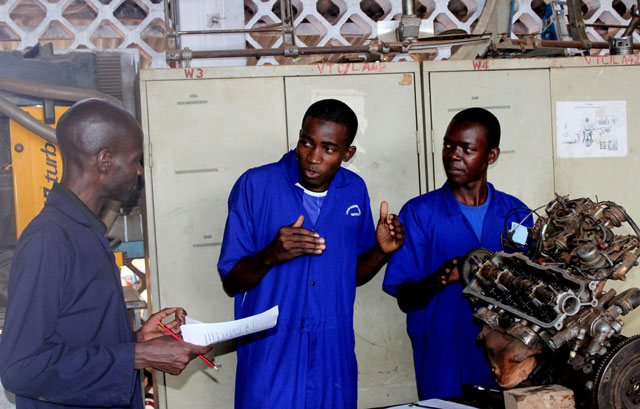
Kampala, Uganda | THE INDEPENDENT | Assessors for the Uganda Business and Technical Examinations Board (UBTEB) practical examinations have decried insufficient equipment as 49,671 candidates commence examinations across the country.
The supervisors, tutors and assessors, say there is scarcity of equipment for certain courses, which is likely to delay the conclusion of certain papers as students share the limited equipment.
Those who sat on Tuesday included candidates on the National certificate (Technical and Vocational), Uganda Community Polytechnic certificate and advanced craft.
The November/December 2019 examinations series will end on December 17th 2019 in 572 Examinations centres across the country.
URN visited Lugogo Vocational Educational Institute (LVTI) where it was a bee-hive activity for students, tutors and assessors who were monitoring the practical examinations.
At this center, a total of 940 candidates registered for the examination series. Out of those sitting at the center, 817 are males while 123 are females.
Olam Omitta, the Deputy Principal at Lugogo Vocational Institute said it would take 26 students who were doing practical welding more than a day to complete their examination using one source of gas.
“It is only lack of enough equipment but each person has his assignment and his piece of fabrication to weld. So we utilize this single source of gas and that is why we time them in phases. But when you just clock once and say stop, you will have only gone with one student.”
Omitta decried the shortage of essential equipment to allow all students sit their examinations and complete at once.
According to Omitta, candidates sitting Mechanical Engineering Craft exam must brave a 40-hour assessment examination.
Lucy Kahunde, an assessor from the Directorate of Industrial Training (DIT) who is currently supervising the UBTEB construction exams, said the practical examination for construction went well without any candidate missing out on materials.
Candidates were provided with both new and old bricks and sand. The assessors said they expect the students to come up with the best construction with proper measurements.
Pius Chemonges Achen, a student of Carpentry and Joinery at the institute, said he was prepared to pass the examination.
While answering one of the practical questions that required each student to make a nursery desk, Achen told URN that they faced a challenge of wet timber, which was difficult to plain during the paper.
Richard Ayen, a senior Wood Work instructor who is assessing carpentry and joinery students sitting the November-December examinations, said they had registered 19 students for the course but one fell ill and missed the paper.
According to Ayen, his role in this examination is to examine whether the students have accuracy in their measurements, their safety with particular interest in whether the candidates have protective gear on the feet and overalls among others.
A total of 17 candidates are sitting for their painting and decoration papers at Lugogo vocational Training Institute. URN caught up with Charles Kalimugi, an instructor of painting and decorating from Butaleja Technical Institute who is currently assessing candidates.
Kalimugi said he assessing the students’ abilities to produce paintings that match the required standards. He argued however that the space the students are working from is too small.
Christopher Obol, an instructor and assessor for Motor vehicle repair, said they have 90 candidates who registered for the practical examination but with few equipment to use.
Candidates have been given faulty engines and they are expected to check and operate them within a specified time and have it started.
Obol argues that because of the scarcity of equipment, one day might not be enough for all the candidates sitting the examination to be assessed.
Mercelina Akumo Jalwoch, one of the two female students sitting for the 40-hour examinations spoke to URN about her inspiration to do factory fitting and machining, a trade largely dominated by males.
George Shillingi Mwesigye, the Principal Lugogo Institute urged females to take on the vocational skills training, saying it is where they benefit smartly using their skills.
“We admit that we still have few ladies offering this course but this has to do with their attitude towards these professions. Ladies still have biases against this course but otherwise, whatever a man can do, a woman can do. That is why you see men are also engaging in saloon. And they are doing a good job. I think we have improved because we used to have no female or even a small number,” George Shillingi said.
******
URN
 The Independent Uganda: You get the Truth we Pay the Price
The Independent Uganda: You get the Truth we Pay the Price


